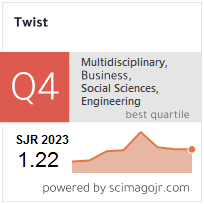The Impact of Teleworking on the Quality of Knowledge Sharing During and After Covid-19
Clusters in Morocco as a Case Study
Keywords:
Knowledge sharing, Telework, Clusters, Covid-19Abstract
In early 2020, the coronavirus pandemic spread around the world and many countries introduced confinement measures encouraging the population to limit physical contact. These restrictions limited the costs of agents, the movement of workers and trade between countries, creating demand shocks that have had repercussions for the entire global production structure. The Covid-19 crisis has created a sudden need for companies and their employees to introduce or improve teleworking, which is strongly encouraged by both private and public companies. Many clusters in Morocco are discovering, on the one hand, the benefits of teleworking to further their business model, and on the other hand, the digital divide that separates them and allows them to achieve cohesive, better communicated and more efficient teams through collaborative working. In addition, the degree to which organizations are prepared to adopt teleworking, the new format of the working environment of the future, requires the implementation of knowledge management tools that adapt to the new situation and its new contingencies. Hence the problem of our study, which aims to understand how this transition can be carried out successfully with the required quality of knowledge sharing. The aim of this article is to examine the adaptation and satisfaction of Moroccan people towards telework and its impact on the quality of knowledge sharing, using a quantitative approach, with 210 teleworkers working in Moroccan clusters during and after Covid-19.
Downloads
Downloads
Published
Issue
Section
License
Copyright (c) 2024 TWIST

This work is licensed under a Creative Commons Attribution-NonCommercial-ShareAlike 4.0 International License.











